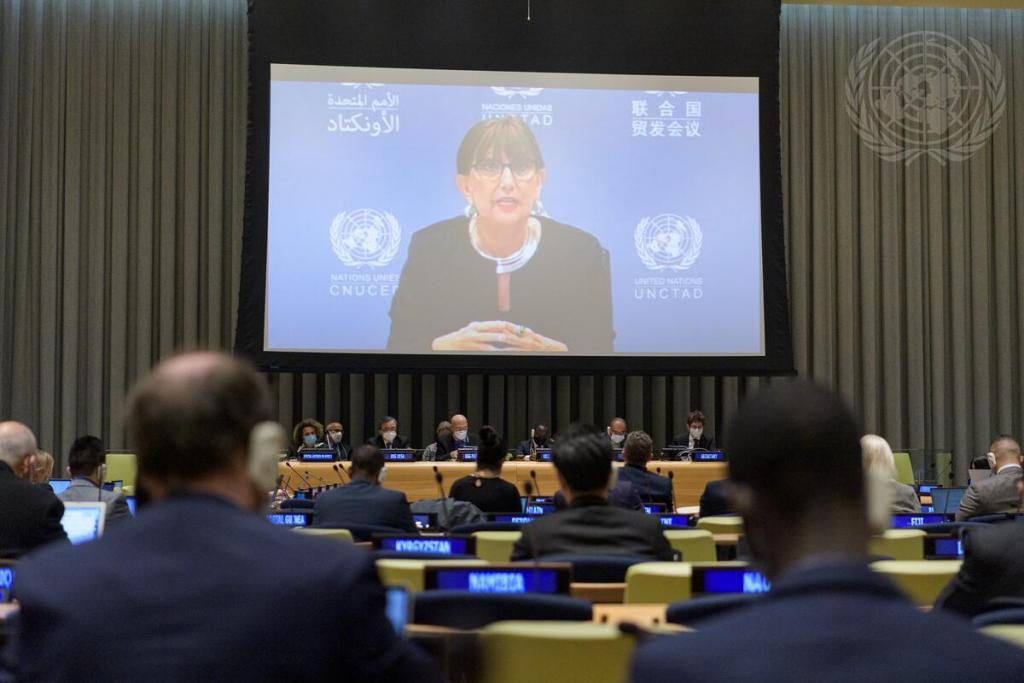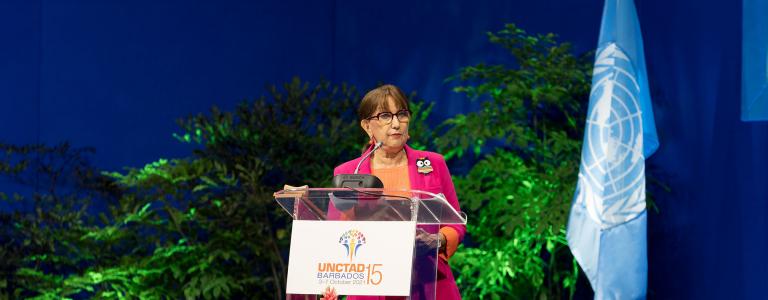Steering a More Inclusive Post-Pandemic Recovery: An interview with UNCTAD’s Rebeca Grynspan
Rebeca Grynspan stepped into her role as UNCTAD’s secretary-general in the midst of the pandemic and has set her sights on ensuring the organization helps steer an “inclusive recovery from this very divisive crisis.” Jennifer Freedman, managing editor of IISD’s Trade and Sustainability Review, interviews Grynspan to find out more about her priorities for the coming years.
Rebeca Grynspan has already made her mark at the United Nations Conference on Trade and Development (UNCTAD) by becoming the first woman and Central American to serve as the organization’s secretary-general. But with a new mandate guiding UNCTAD’s work for the next 4 years, she’s set her sights on steering the agency through the COVID-19 pandemic and driving changes that will have a real and lasting impact on developing countries.

Grynspan, an economist and former vice president of Costa Rica, stepped into her new role in the midst of a health crisis that has devastated poor nations in particular and initially triggered some of the largest global drops in trade and output volumes since World War II. And just one month into the job, she received her new orders in the form of the Bridgetown Covenant, which was endorsed at UNCTAD’s 15th quadrennial conference last October.
The Bridgetown Covenant instructs UNCTAD to “move to a more resilient, digital, and inclusive world of shared prosperity [by] transforming economies through diversification; fostering a more sustainable and more resilient economy; improving the way development is financed; and revitalizing multilateralism.” This call for action describes how each strategy can be realized to move us closer to achieving the Sustainable Development Goals. It instructs the agency to play a role through its analysis, capacity-building, and consensus-building pillars.
Grynspan takes those orders seriously. She says it is a “privilege” to be leading UNCTAD “in the midst of a global crisis and when we are asked to step up and really contribute to a more inclusive recovery from this very divisive crisis.”
Addressing Inequality in the Post-Pandemic Trade World
“I arrived at this institution at a time of disruption, but also of opportunity,” she said in an interview. “My first goal for my mandate will be to rethink the development economics discourse to one that can amplify win-wins and redirect trade-offs and really serve developing countries and support them to access the advantages of global trade. We also need to integrate environment and climate change into UNCTAD’s work from the development perspective.”
I arrived at this institution at a time of disruption, but also of opportunity.
Another priority is ensuring stronger technical cooperation that is broader, deeply entrenched, and leads to more financing and more projects tailored to the needs of developing economies, Grynspan said. She’s also aiming to “revitalize” the intergovernmental space and the consensus-building pillar.
I cannot say the job ahead will be easy, but I am convinced that UNCTAD has the expertise, knowledge, and leadership to make a real difference in shaping the post-pandemic trade world,” she said. “We need to avoid another lost decade of development for developing countries.”
COVID-19 has laid bare the deep divisions between developing and developed countries and aggravated the problems that poorer nations faced before the crisis, Grynspan says. It has also shed light on a “structural dysfunction” of the world economy supply chains.
I cannot say the job ahead will be easy, but I am convinced that UNCTAD has the expertise, knowledge, and leadership to make a real difference in shaping the post-pandemic trade world.
“The pandemic underscored the uneven resilience and capacities of countries to deal with crises. Uneven resilience. Uneven capacities to deal with crises. This is the biggest lesson this pandemic has given us. The fact that inequality breeds fragility. That the higher the inequality, the greater the impact. UNCTAD will continue to help developing countries mitigate those risks,” she said.
Is the Bridgetown Covenant Ambitious Enough?
Some critics say UNCTAD’s new mandate doesn’t do enough to help developing countries in the face of the pandemic.
This was one of the first opportunities for the international community to step up to the plate to ensure that millions—possibly billions—of people would not remain impoverished by the economic tsunami wrought by the COVID-19 crisis,” wrote Deborah James of the Center for Economic and Policy Research. “While the mandate does clearly lay out the multiple and overlapping health, economic, and social crises faced by developing countries at this point, it unfortunately falls short of meeting the moment.”
James blamed “a few developed countries,” led by the European Union delegation, for blocking “what could have been a bold agreement to strengthen the role of UNCTAD in shaping a transformative agenda in tune with the challenges facing policymakers across the developing world.”
But Grynspan says the agency’s future work is based on an “extremely ambitious agenda which will see UNCTAD actively speak on many issues related to trade and development, including finance, investment, technology, and entrepreneurship, that need to be addressed in the context of this pandemic.” /p>
James says Grynspan “is off to a good start” in identifying some of the key issues in developing countries, such as special drawing rights, debt sustainability analysis and restructuring, stopping the “hemorrhaging” caused by illegal trade flows (such as was exposed in the Pandora Papers), and recognizing the importance of research and evidence-based policies to inform the technical cooperation and consensus-building pillars, especially in UNCTAD’s work on trade and technology.
“She also seems to be breathing fresh air into UNCTAD’s collaboration with civil society, which will benefit members’ ability to access their expertise,” James wrote.
Putting the Mandate Into Practice
Grynspan offered several concrete examples of how UNCTAD plans to forge ahead with its mandate.
“We will work more on supporting developing countries access investment for trade and infrastructure resilience, we will advocate for a more ambitious mechanism for debt management and financing of recovery, including through the recycling of special drawing rights—an area in which UNCTAD has a 50-year expertise at least,” she said.
We will work more on supporting developing countries access investment for trade and infrastructure resilience, we will advocate for a more ambitious mechanism for debt management and financing of recovery, including through the recycling of special drawing rights.
The Geneva-based agency will also address the need to mitigate the digital divide that developing countries face, Grynspan says. This will involve “supporting capacity building for e-trade, digital value creation, data governance, and more broadly productive capacities and diversification in all sectors.”
UNCTAD “fully recognizes” that the combined effects of the pandemic and climate change create global challenges that require coordinated, global solutions.
“The United Nations and UNCTAD, of course, with its universal convening power, is the appropriate forum for a multilateral dialogue on the post-pandemic world we want,” Grynspan said. “This is not a minor program of work.”
Jennifer Freedman is the managing editor of the Trade and Sustainability Review.
Banner photo: UNCTAD Photo/Tim Sullivan CC BY-SA 2.0
You might also be interested in
CSDDD: EU's Due Diligence Law Vote Should Drive Supply Chain Sustainability Efforts
The European Parliament has voted to adopt the Corporate Sustainability Due Diligence Directive, aiming to address the environmental and social impacts of the supply chains of Europe's large corporations.
Will the Inclusion of Voluntary Standards in Trade Agreements Lead to More Sustainable Trade?
The use of voluntary sustainability standards (VSSs) and similar systems in free trade agreements (FTAs) is gaining traction. Will it lead to more sustainable production and consumption globally?
Ecuador Referendum Rules Out ISDS Return, Underlining Public Support for a Sustainable Path
Ecuador has voted to allow international arbitration and investor–state dispute settlement (ISDS) in its treaties and agreements. But the risks that initially made them turn away from this outdated model remain.
A Sustainable Asset Valuation Assessment of Building and Transport Infrastructure Investment in the Shymkent-Tashkent-Khujand Economic Corridor
This report presents the Sustainable Asset Valuation (SAVi) of a proposed transport and building infrastructure development on the border of Kazakhstan and Uzbekistan to promote close and mutually beneficial trade relationships between the countries.
